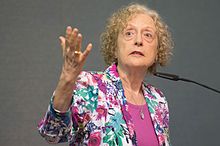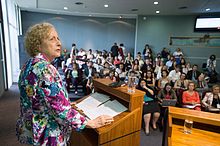Carole Pateman
Carole Pateman | |
|---|---|
 Pateman in 2015 | |
| Born | 11 December 1940 |
| Alma mater | University of Oxford |
| Known for | Criticism of liberal democracy |
| Awards | Johan Skytte Prize in Political Science |
| Scientific career | |
| Institutions | University of California at Los Angeles (UCLA) |
Carole Pateman FBA FAcSS FLSW (born 11 December 1940) is a British feminist and political theorist. She is known as a critic of liberal democracy and has been a member of the British Academy since 2007.[1]
Biography

Pateman was born in Maresfield, Sussex, England. Educated at Lewes County Grammar School for Girls, she left at age 16. She entered Ruskin College, Oxford in 1963 studying economics, politics, history and sociology, achieving a distinction. She won a place at Lady Margaret Hall to read PPE, staying on to earn a DPhil.
In 1972, she became lecturer in political theory at the University of Sydney.[1] Since 1990, Professor Pateman has taught in the Department of Political Science at the University of California at Los Angeles (UCLA), where she is now a Distinguished Professor Emeritus.[2] Professor Pateman served as (the first woman) President of the International Political Science Association (1991–1994). In 2007, she was named a Fellow of the British Academy.[2] She served as president of the American Political Science Association from 2010–2011. She is also an Honorary Professor for the Cardiff University School of European Studies.
She gave the Faculty Research Lecture at UCLA in 2001, and is a Fellow of the American Academy of Arts and Sciences, the British Academy and the UK Academy of Social Sciences. She holds honorary degrees from the Australian National University, the National University of Ireland, and Helsinki University.
Awards
Pateman was a Guggenheim Fellow 1993–1994.
Since 1994 Pateman has been a Member of the International Advisory Board of the Swedish Collegium for Advanced Study in the Social Sciences.
In 2012 she was awarded the Johan Skytte Prize in Political Science.[3]
In 2013, she earned the Special Recognition Award by the UK Political Studies Association.
In April 2015, she was elected as a Fellow of the Learned Society of Wales.[4][5]
The Australian Political Science Association (APSA) awards the Carole Pateman prize biennially for the best book published on the topic of gender and politics.[6]
Bibliography
Books
- Pateman, Carole (1970). Participation and democratic theory. Cambridge England: Cambridge University Press. ISBN 978-0-521-29004-3.
- Pateman, Carole (1979). The problem of political obligation: a critical analysis of liberal theory. Chichester New York: Wiley. ISBN 978-0-471-99699-6.
- Pateman, Carole (1985). The problem of political obligation: a critique of liberal theory. Cambridge: Polity in association with Blackwell. ISBN 978-0-7456-0135-9.
- Pateman, Carole (1988). The Sexual Contract. Cambridge: Polity in association with Blackwell. ISBN 0804714770
- Pateman, Carole (1989). The disorder of women: democracy, feminism, and political theory. Stanford, California: Stanford University Press. ISBN 978-0-8047-1765-6.
- Pateman, Carole; Dowding, Keith; Goodin, Robert E. (2004). Justice and democracy: essays for Brian Barry. Cambridge New York: Cambridge University Press. ISBN 978-0-521-83695-1.
- Pateman, Carole; Mills, Charles W. (2007). Contract and domination. Cambridge: Polity Press. ISBN 978-0-7456-4004-4.
Edited books
- Pateman, Carole; Sawer, Marian (1980). Australasian Political Studies Association directory of women political scientists 1980. Canberra: Australasian Political Studies Association. OCLC 220934996.
- Pateman, Carole; Goodnow, Jacqueline (1985). Women, social science and public policy. Sydney London: Allen & Unwin. ISBN 978-0-86861-685-8.
- Pateman, Carole; Shanley, Mary Lyndon (1991). Feminist interpretations and political theory. University Park: Pennsylvania State University Press. ISBN 978-0-271-00742-7.
- Pateman, Carole; Murray, Matthew C. (2012). Basic income worldwide horizons of reform. Houndmills, Basingstoke New York, New York: Palgrave Macmillan. ISBN 978-0-230-28542-2.
- Pateman, Carole (2014). Feminist challenges: social and political theory (2nd ed.). London: Routledge. ISBN 978-1-138-00068-1. Original printed in 1986.
Chapters in books
- Pateman, Carole (2003), "Freedom and democratization: why basic income is preferred to basic capital", in Dowding, Keith; de Wispelaere, Jurgen; White, Stuart (eds.), The ethics of stakeholding, New York: Palgrave Macmillan, pp. 130–148, ISBN 978-1-4039-0580-2.
Journal articles
- Pateman, Carole, ed. (1983). "Introduction". Australian Journal of Political Science. 18 (2): 1–2. doi:10.1080/00323268308401882.
- Pateman, Carole (March 2012). "Participatory Democracy Revisited". Perspectives on Politics. 10 (1): 7–19. CiteSeerX 10.1.1.646.7316. doi:10.1017/S1537592711004877. S2CID 145534893.
Videos
- The Equivalent of the Right to Land, Life, and Liberty? Democracy and the Idea of a Basic Income (Link)
See also
References
- ^ a b John Lechte (1994). Fifty Key Contemporary Thinkers: From Structuralism to Postmodernity. Routledge. ISBN 978-0-415-07408-7.
- ^ a b Carole Pateman faculty page at UCLA
- ^ "Carole Pateman winner of the Johan Skytte Prize 2012". Uppsala universitet, MedfarmDoIT. 29 September 2012. Retrieved 23 September 2014.
- ^ Fellows elected to the Learned Society of Wales. British Academy. Published 24 April 2015. Retrieved 1 July 2018.
- ^ Professor Carole Pateman. Learned Society of Wales. Retrieved 1 July 2018.
- ^ "Carole Pateman Prize | Australian Political Studies Association". Archived from the original on 18 February 2017. Retrieved 13 March 2015.
Further reading
- On, Steve (2012), "A conversation with Carole Pateman: reflections on democratic participation, The Sexual Contract, and power structures.", in Browning, Gary; Dimova-Cookson, Maria; Prokhovnik, Raia (eds.), Dialogues with contemporary political theorists, Houndsmill, Basingstoke, Hampshire New York: Palgrave Macmillan, pp. 139–154, ISBN 978-0-230-30305-8
External links
 Media related to Carole Pateman at Wikimedia Commons
Media related to Carole Pateman at Wikimedia Commons- Carole Pateman Papers - Pembroke Center Archives, Brown University